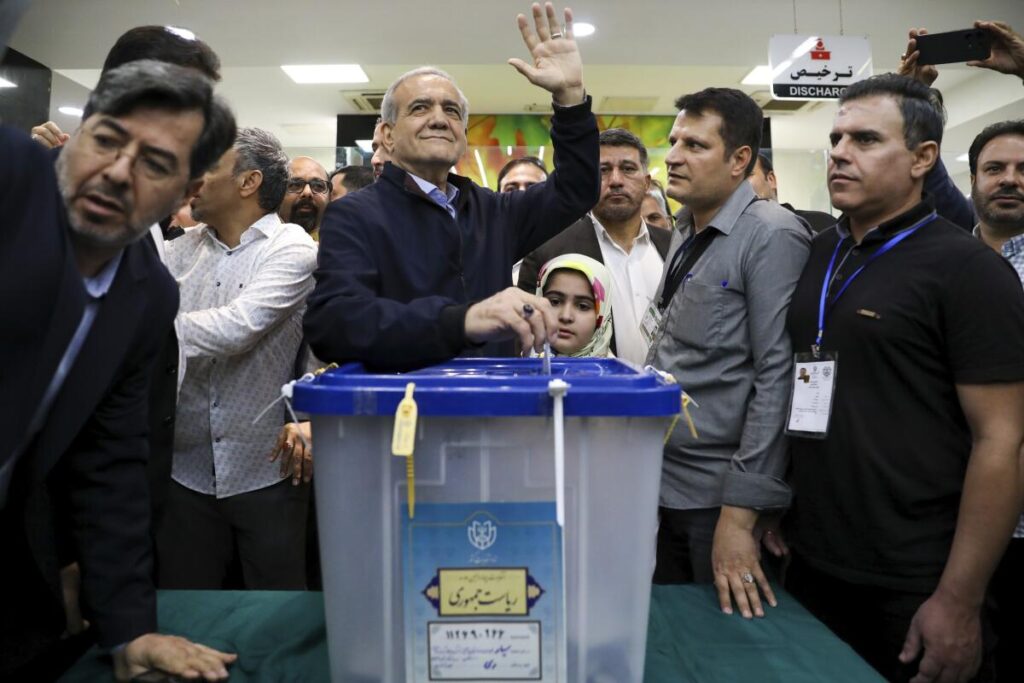A runoff presidential election is scheduled for July 5 in Iran. After a historic low turnout on Friday none contenders received more than 50% of vote.
Historic Low Turnout In Iran’s Election
“None of the candidates could garner the absolute majority of the votes.
Therefore, the first and second contenders who got the most votes will be referred to the Guardian Council.
For the second round,” said an Interior Ministry spokesperson Mohsen Eslami.
Ebrahim Raisi’s Death
The late president Ebrahim Raisi’s death in a helicopter crash this month. Prompted the early scheduling of the presidential elections, which were originally scheduled for 2025.
Israel & Iranian Allies Conflict
The surveys are released at the same time that regional tensions are rising.
As a result of the conflict between Israel and its Iranian allies, Hamas in Gaza and Hezbollah in Lebanon. And growing pressure from the West on Iran over its rapidly developing nuclear program.
The interior ministry announced on Saturday that more than 24 million ballots had been counted.
With moderate politician Massoud Pezeshkian leading with over 10 million votes.
Ahead of hardline diplomat Saeed Jalili with over 9.4 million votes.
Pezeshkian and Jalili
Pezeshkian and Jalili, who both emerged as front-runners in yesterday’s surveys, will face off in the run-off to determine who would succeed Raisi.
Since 2008, Pezeshkian, 69, a heart surgeon, has served as the northern city of Tabriz’s parliamentary representative.
Under the reformist Mohammad Khatami, who led Iran from 1997 to 2005 and supported Pezeshkian’s candidature in the current elections, he held the position of health minister.
A Nuclear Negotiator
Jalili, on the other hand, used to be a nuclear negotiator and had a number of high posts in the nation, including one in the early 2000s in the office of the Supreme Leader Ayatollah Ali Khamenei.
He presently serves as one of Khamenei’s delegates to Iran’s highest security council, the Supreme National Security Council.
According to Eslami, Mostafa Pourmohammadi received 206,397 votes, while parliament speaker Mohammad Bagher Ghalibaf received roughly 3,383,340 votes.
He continued, stating that 24,500,000 of the 61 million eligible voters cast ballots, making this the lowest turnout in the history of the nation at almost 40%.
Since the revolution in 1979, Iran has held 13 presidential elections; just one of them, in 2005, resulted in runoffs.
6 Candidates Accepted By The Guardian Council
The six candidates were initially accepted by the Guardian Council, which evaluates candidates for elections.
However, Raisi’s vice president Amir-Hossein Ghazizadeh-Hashemi and Tehran Mayor Alireza Zakani withdrew from the contest one day before the vote.
How each contender would address the current economic problems of those who are struggling to make ends meet is a critical challenge.
Given that Khamenei has final say over all things of great national importance.
Iran’s Nuclear Program
It is unlikely that the incoming president will bring about any significant changes to Iran’s nuclear programme or its backing of paramilitary groups throughout the Middle East.
But the president is in charge of the administration on a day-to-day basis and has the power to shape Iran’s foreign and internal policies.
To read our blog on “Iran’s nuclear risk; US put in the more sanctions now,” click here
